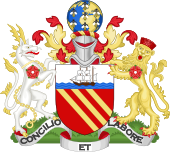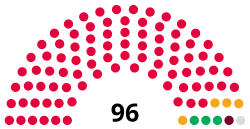
A | B | C | D | E | F | G | H | CH | I | J | K | L | M | N | O | P | Q | R | S | T | U | V | W | X | Y | Z | 0 | 1 | 2 | 3 | 4 | 5 | 6 | 7 | 8 | 9
Manchester City Council | |
|---|---|
 Coat of arms | |
Corporate logo | |
| Type | |
| Type | |
| Leadership | |
Joanne Roney since April 2017 | |
| Structure | |
| Seats | 96 councillors[3] |
 | |
Political groups |
|
Joint committees | Greater Manchester Combined Authority Greater Manchester Police, Fire and Crime Panel |
Length of term | 4 years |
| Elections | |
Last election | 2 May 2024 |
Next election | 7 May 2026 |
| Motto | |
| Latin: Concilio Et Labore, lit. 'By Wisdom and Effort' | |
| Meeting place | |
 | |
| Town Hall, Albert Square, Manchester, M60 2LA | |
| Website | |
| www | |
Manchester City Council is the local authority for the city of Manchester in Greater Manchester, England. Manchester has had an elected local authority since 1838, which has been reformed several times. Since 1974 the council has been a metropolitan borough council. It provides the majority of local government services in the city. The council has been a member of the Greater Manchester Combined Authority since 2011.
The council has been under Labour majority control since 1971. It is based at Manchester Town Hall.
History
Manchester had been governed as a borough in the 13th and 14th centuries, but its borough status was not supported by a royal charter. An inquiry in 1359 ruled that it was only a market town, not a borough. It was then governed by manorial courts and the parish vestry until the 18th century.[4]

In 1792 a body of improvement commissioners known as the 'Manchester Police Commissioners' was established to provide services in the rapidly growing town. In 1838 the town was incorporated as a municipal borough, after which it was governed by a body formally called the 'mayor, aldermen and burgesses of the borough of Manchester', generally known as the corporation or town council. The police commissioners were disbanded in 1843 and their functions passed to the corporation.[5][6]
Manchester was granted city status in 1853, only the second such grant since the Reformation. After that the corporation was also known as the city council.[4] When elected county councils were established in 1889, Manchester was considered large enough to provide its own county-level services, and so it became a county borough, independent from the new Lancashire County Council, whilst remaining part of the geographical county of Lancashire.[6]
The city boundaries have been enlarged many times. Notable expansions were in 1885 (Bradford, Harpurhey and Rusholme), 1890 (Blackley, Crumpsall, part of Droylsden, Kirkmanshulme, Moston, Newton Heath, Openshaw, and West Gorton), 1903 (Heaton), 1904 (Burnage, Chorlton cum Hardy, Didsbury, and Moss Side), 1909 (Gorton, and Levenshulme), 1931 (Wythenshawe: Baguley, Northenden, and Northen Etchells), and Ringway in 1974. The mayor was granted the title of lord mayor in 1893.[7]
The county borough was abolished in 1974 under the Local Government Act 1972, being replaced by a metropolitan district of Manchester, covering the area of the old county borough plus the parish of Ringway. The new district was one of ten metropolitan districts within the new metropolitan county of Greater Manchester.[8] Manchester's borough and city statuses and its lord mayoralty passed to the new district and its council.[9][10]
In 1980, Manchester was the first council to declare itself a nuclear-free zone. In 1984 it formed an equal opportunities unit as part of its opposition to Section 28.[11]
From 1974 until 1986 the council was a lower-tier authority, with upper-tier functions provided by the Greater Manchester County Council. The county council was abolished in 1986 and its functions passed to Greater Manchester's ten borough councils, including Manchester City Council, with some services provided through joint committees.[12]
Since 2011 the council has been a member of the Greater Manchester Combined Authority, which has been led by the directly elected Mayor of Greater Manchester since 2017. The combined authority provides strategic leadership and co-ordination for certain functions across Greater Manchester, notably regarding transport and town planning, but Manchester City Council continues to be responsible for most local government functions.[13][14]
Governance
Manchester City Council provides metropolitan borough services. Some strategic functions in the area are provided by the Greater Manchester Combined Authority; the leader of the city council sits on the combined authority as Manchester's representative.[15] There is one civil parish in the city at Ringway, with a parish council; the rest of the city is unparished.[16]
Political control
The council has been under Labour majority control since 1971.
Political control of the council since 1919 has been as follows:[17]
County Borough
| Party | Period | |
|---|---|---|
| No overall control | 1919–1921 | |
| Conservative | 1921–1924 | |
| No overall control | 1924–1932 | |
| Conservative | 1932–1934 | |
| No overall control | 1934–1946 | |
| Labour | 1946–1947 | |
| No overall control | 1947–1949 | |
| Conservative | 1949–1952 | |
| No overall control | 1952–1953 | |
| Labour | 1953–1967 | |
| Conservative | 1967–1971 | |
| Labour | 1971–1974 | |
Metropolitan Borough
| Party | Period | |
|---|---|---|
| Labour | 1974–present | |
Leadership
The role of Lord Mayor of Manchester is largely ceremonial. Political leadership is instead provided by the leader of the council. The leaders since 1945 have been:[18]
County Borough
| Councillor | Party | From | To | |
|---|---|---|---|---|
| Tom Nally | Labour | 1945 | 1949 | |
| William Jackson | Conservative | 1949 | 1953 | |
| Tom Nally | Labour | 1953 | 1956 | |
| Bob Thomas | Labour | 1956 | 1962 | |
| Maurice Pariser | Labour | 1962 | 1965 | |
| Bob Thomas | Labour | 1965 | 1967 | |
| Robert Rodgers | Conservative | 1967 | 1970 | |
| Arnold Fieldhouse | Conservative | 1970 | 1971 | |
| Bob Thomas | Labour | 1971 | 1974 | |
Metropolitan Borough
| Councillor | Party | From | To | |
|---|---|---|---|---|
| Norman Morris[19] | Labour | 1974 | 1982 | |
| Bill Egerton | Labour | 1982 | 1984 | |
| Graham Stringer | Labour | 1984 | 1996 | |
| Richard Leese | Labour | 1996 | 1 Dec 2021 | |
| Bev Craig | Labour | 1 Dec 2021 | ||
Composition
Following the 2024 election, the composition of the council was:[20]
| Party | Councillors | |
|---|---|---|
| Labour | 87 | |
| Liberal Democrats | 4 | |
| Green | 3 | |
| Workers Party | 1 | |
| Independent | 1 | |
| Total | 96 | |
The next election is due in May 2026.
Elections
Since the last boundary changes in 2018, the council has comprised 96 councillors representing 32 wards, with each ward electing three councillors. Elections are held three years out of every four, with a third of the council (one councillor for each ward) elected each time for a four-year term of office.[21]
Wards
The council wards are listed under their parliamentary constituency below:

| Blackley and Middleton South | Gorton and Denton | Manchester Central |
|---|---|---|
This constituency also contains
|
This constituency also contains |
This constituency also contains
|
| Manchester Rusholme | Manchester Withington | Wythenshawe and Sale East |
|
This constituency also contains |
Councillors
Each ward is represented by three councillors.[22]
| Parliamentary constituency | Ward | Councillor | Party | Term of office | |
|---|---|---|---|---|---|
| Blackley and Middleton South constituency |
Charlestown | Basil Curley | Labour | 2023–27 | |
| Umza Jafri | Labour | 2024–28 | |||
| Veronica Kirkpatrick | Labour | 2022–26 | |||
| Crumpsall | Fiaz Riasat | Labour | 2023–27 | ||
| Nasrin Ali | Labour | 2024–28 | |||
| Mohammad Amin | Labour | 2022–26 | |||
| Harpurhey | Pat Karney | Labour | 2023–27 | ||
| Joanne Green | Labour | 2024–28 | |||
| Sandra Collins | Labour | 2022–26 | |||
| Higher Blackley | Paula Sadler | Labour | 2023–27 | ||
| Julie Connolly | Labour | 2024–28 | |||
| Olusegun Ogunnambo | Labour | 2022–26 | |||
| Moston | Yasmine Dar | Labour | 2023–27 | ||
| Sherita Mandongwe | Labour | 2024–28 | |||
| Paula Appleby | Labour | 2022–26 | |||
| Gorton and Denton constituency |
Burnage | Azra Ali | Labour | 2023–27 | |
| Bev Craig | Labour | 2024–28 | |||
| Murtaza Iqbal | Labour | 2022–26 | |||
| Gorton and Abbey Hey | Afia Kamal | Labour | 2023–27 | ||
| Julie Reid | Labour | 2024–28 | |||
| Louis Hughes | Labour | 2022–26 | |||
| Levenshulme | Basat Sheikh | Labour | 2023–27 | ||
| Zahid Hussain | Labour | 2024–28 | |||
| Dzidra Noor | Labour | 2022–26 | |||
| Longsight | Suzanne Richards | Labour | 2023–27 | ||
| Shahbaz Sarwar | Workers Party | 2024–28 | |||
| Abid Chohan | Labour | 2022–26 | |||
| Manchester Central constituency |
Ancoats and Beswick | Chris Northwood | Liberal Democrats | 2023–27 | |
| Alan Good | Liberal Democrats | 2024–28 | |||
| Irene Robinson | Labour | 2022–26 | |||
| Cheetham | Shazia Butt | Labour | 2023–27 | ||
| Shaukat Ali
Zdroj:https://en.wikipedia.org?pojem=Manchester_City_Council Text je dostupný za podmienok Creative Commons Attribution/Share-Alike License 3.0 Unported; prípadne za ďalších podmienok. Podrobnejšie informácie nájdete na stránke Podmienky použitia.
Analytika
Antropológia Aplikované vedy Bibliometria Dejiny vedy Encyklopédie Filozofia vedy Forenzné vedy Humanitné vedy Knižničná veda Kryogenika Kryptológia Kulturológia Literárna veda Medzidisciplinárne oblasti Metódy kvantitatívnej analýzy Metavedy Metodika Text je dostupný za podmienok Creative
Commons Attribution/Share-Alike License 3.0 Unported; prípadne za ďalších
podmienok. www.astronomia.sk | www.biologia.sk | www.botanika.sk | www.dejiny.sk | www.economy.sk | www.elektrotechnika.sk | www.estetika.sk | www.farmakologia.sk | www.filozofia.sk | Fyzika | www.futurologia.sk | www.genetika.sk | www.chemia.sk | www.lingvistika.sk | www.politologia.sk | www.psychologia.sk | www.sexuologia.sk | www.sociologia.sk | www.veda.sk I www.zoologia.sk | |||||
